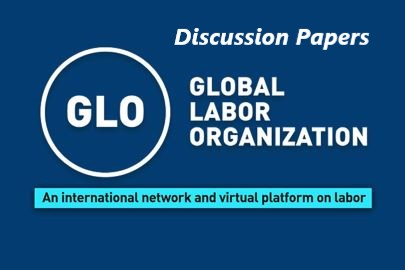The new GLO Discussion Paper findings suggest that, in contrast to passive labor market policies, investing in active labor market policies increases the re-employment probability and the re-employment duration, reduces the risk of staying unemployed, and leads to higher wages at the lower end of the conditional wage distribution.

GLO Discussion Paper No. 1288, 2023
Firm Closures and Labor Market Policies in Europe: Evidence from Retrospective Longitudinal Data – Download PDF
by Theodoropoulos, Nikolaos & Voucharas, Georgios
GLO Fellow Nikolaos Theodoropoulos
Author Abstract: We examine the impact of active and passive labor market policies expenditures on the probability of re-employment, re-employment duration, unemployment duration, and re-employment wages in the case of job displacements due to firm closures. We use retrospective homogeneous longitudinal data from the Survey of Health, Ageing and Retirement in Europe and OECD data for 24 countries over the period 1985-2017 and we operate within alternative econometric frameworks. Our findings suggest that, in contrast to passive labor market policies, investing in active labor market policies increases the re-employment probability and the re-employment duration, reduces the risk of staying unemployed, and leads to higher wages at the lower end of the conditional wage distribution. Passive labor market policies estimates offset active labor market estimates and their interaction effect is always negative, but complementarities effects are found for Northern countries. By breaking down active and passive labor market policies into eight subcomponents, our results indicate that they have significant heterogeneous effects within and across labor market outcomes. Further, expenditures on labor market policies vary substantially across regions. For instance, active labor market policies have a stronger impact for Eastern countries, whereas passive labor market policies such as out-of-work income has a positive impact for Southern countries. Further, females are found to benefit more from active labor market policies in terms of re-employment probability, duration of re-employment, and risk of unemployment, but not in terms of wages, compared to males. Policymakers may consider the importance of implementing diverse reforms tailored to different countries and groups to enhance the effectiveness of labor market policies.
Journal of Population Economics (JOPE)
JOPE has CiteScore 9.2 (2022, LINK) & Impact Factor 6.1 (2022)
JUST PUBLISHED
Vol. 36, Issue 3, July 2023: 26 articles on: Aspirations and preferences; Environment, Weather, Climate; Family; Fertility; Historical demography; Ageing, pensions, social security; Migration
https://link.springer.com/journal/148/volumes-and-issues/36-3
CALL FOR PAPERS
JOPE invites paper submissions for the following collections:
– Abortions
– Covid-19 and diseases
– Lifecycle fertility models
– Sexual and domestic violence
– Sexuality including LGBT issues
– Statistics & measurement of population economics
For more details and for examples of already published papers in these collections see:
https://glabor.org/collections-journal-of-population-economics-invites-paper-submissions-in-six-research-areas/
https://link.springer.com/journal/148/collections
JOPE Collections are a set of published papers on issues of significant relevance for the journal. Authors are continuously invited to submit their related work for evaluation stating their specific interest to contribute in the submission cover letter. JOPE Editors will treat those submissions with particular interest and speedy handling. Articles will be immediately published after final acceptance.

GLO Discussion Papers are research and policy papers of the GLO Network which are widely circulated to encourage discussion. Provided in cooperation with EconStor, a service of the ZBW – Leibniz Information Centre for Economics, GLO Discussion Papers are among others listed in RePEc (see IDEAS, EconPapers). Complete list of all GLO DPs – downloadable for free.
The Global Labor Organization (GLO) is an independent, non-partisan and non-governmental organization that functions as an international network and virtual platform to stimulate global research, debate and collaboration.
Ends;

